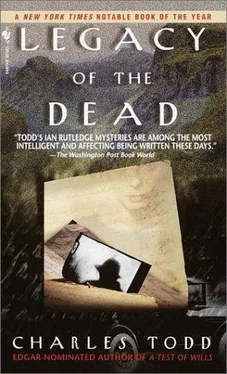Charles Todd - Legacy of the Dead
Здесь есть возможность читать онлайн «Charles Todd - Legacy of the Dead» весь текст электронной книги совершенно бесплатно (целиком полную версию без сокращений). В некоторых случаях можно слушать аудио, скачать через торрент в формате fb2 и присутствует краткое содержание. Жанр: Полицейский детектив, на английском языке. Описание произведения, (предисловие) а так же отзывы посетителей доступны на портале библиотеки ЛибКат.
- Название:Legacy of the Dead
- Автор:
- Жанр:
- Год:неизвестен
- ISBN:нет данных
- Рейтинг книги:5 / 5. Голосов: 1
-
Избранное:Добавить в избранное
- Отзывы:
-
Ваша оценка:
- 100
- 1
- 2
- 3
- 4
- 5
Legacy of the Dead: краткое содержание, описание и аннотация
Предлагаем к чтению аннотацию, описание, краткое содержание или предисловие (зависит от того, что написал сам автор книги «Legacy of the Dead»). Если вы не нашли необходимую информацию о книге — напишите в комментариях, мы постараемся отыскать её.
Legacy of the Dead — читать онлайн бесплатно полную книгу (весь текст) целиком
Ниже представлен текст книги, разбитый по страницам. Система сохранения места последней прочитанной страницы, позволяет с удобством читать онлайн бесплатно книгу «Legacy of the Dead», без необходимости каждый раз заново искать на чём Вы остановились. Поставьте закладку, и сможете в любой момент перейти на страницу, на которой закончили чтение.
Интервал:
Закладка:
He followed her into a sitting room cluttered with glass bells covering specimens of dead animals. Giant fish and heads of deer decorated the walls. She caught his eye and said, “My late husband liked to kill things. Birds, red deer, fish-never understood it myself, but there you are. That chair, over there, if you please. I can hear you better. Barbara-my niece-calls it barbaric. But I suppose I’ve grown used to seeing them. That’s a particularly fine fox, you know. I’m told several of the birds are nice as well.”
Hamish said, “I wonder who killed her husband?”
Catching the eye of a snarling lynx, Rutledge took the chair Mrs. Raeburn indicated. After a moment, he said, “I’ve just come from speaking with Mr. Fraser. He tells me Captain Burns had given you a key before he went away to France.”
“Mr. Fraser is wrong. Captain Burns gave me the key in 1912, when he joined the practice. I was to let in the painters and carpenters. After they’d finished, he told me to keep it in the event more work had to be done.”
“Did he have guests often?”
“At first he did. His fiancee and her family came to dinner any number of times. After the war started, there was less entertaining. But he came home when he could and sometimes brought friends.”
“Do you recall hearing the name Eleanor Gray?”
“He was in mourning. His fiancee died unexpectedly in late 1915. There was never any other young lady. The Captain never said anything to me about another young lady!”
“Fellow officers, then,” Rutledge amended hastily.
“Oh, yes, he sometimes offered them the house. There was a blind officer who stayed for a month. And a flier with severe burns on the face and hands. Better off dead, if you ask me. And one or two others on leave, with no place of their own.”
“Was there an officer here-just about the time word came that Captain Burns was a casualty? I believe he might have brought a woman with him.”
“There was an officer about that time. From London. I can’t tell you his name. But he came alone, arriving quite late. That’s why I remember him.”
“Because he came later than expected?”
“No, no. He woke me out of a sound sleep, all but knocking the door down. It was raining, and he was wet through. I handed him the key, then slammed the door shut against the wind. But I watched from the window to see he got in all right. The lock is sometimes stiff in bad weather. I’d have known if he’d had a woman with him, wouldn’t I? I’d have seen her go in with him!”
“How long did he stay at the Burns house?”
“He was to stay a week, and left after two days.”
“Did he tell you why he was leaving?”
“I didn’t ask. He brought back the key and thanked me. But it had rained every day. I suppose he found that depressing.”
“How was he wounded? Shoulder? Leg?”
“Sometimes it isn’t possible to tell, and I never care to ask. He was very brown. I did ask about that. He’d served in Palestine, he said.”
“Was he Scots?”
“Yes. He told me he was English, but he was Scots.”
“Would you recognize him if you were to see him again?”
She shook her head. “I expect I wouldn’t. He didn’t have a remarkable face.” She studied Rutledge, pushing her spectacles up on her nose. “You do. I’d remember meeting you.”
Rutledge said, “If you still have the key, would you allow me to go in and look through the house?”
She stared at him suspiciously. “Why should you wish to do that?”
“I’m sorry. I’m not at liberty to say.”
“Oh, very well. Come along. But I warn you, I can’t stand on my feet while you take your time about it!”
She went off to fetch the key, and led him to a gate in the middle of the low hedge between the two properties. He looked at the house carefully as they made their way around back. If the bedrooms were on this side, Mrs. Raeburn might well know who had come to stay here. But if they were on the other side Mrs. Raeburn unlocked the garden door and bade him wipe his feet before he came into the house. He did as he was told, then followed her down a short passage to the kitchen.
As they walked in, Hamish objected, “There’s nithing to find here-”
He was right, the house would have been cleaned many times since Eleanor Gray had come here-if indeed she’d come at all. But Rutledge thought now he could guess the reason why she might have wished to. With news of Robbie Burns’s death, she had wanted to see the house where he lived. Where she might have lived as his wife. But where would she have gone from here?
Rutledge and Mrs. Raeburn walked from room to room. The dining room, the parlor, a small study. The furnishings were comfortable, with a number of lovely old pieces that Burns must have inherited, and a wonderful mantelpiece in the parlor. Upstairs there were two bedrooms, one on Mrs. Raeburn’s side of the house, and one on the other, with a sitting room in between. The far bedroom appeared to be the master bedroom, and Rutledge studied it with particular interest.
It held a large spindle bed, a wardrobe of carved mahogany, a maple desk under the window, several comfortable chairs, and a tall bureau that matched the wardrobe. He went to that and was about to open one of the drawers, but Mrs. Raeburn stopped him.
She didn’t hold with police prying into people’s lives, and told him so. “Not without a warrant!”
He turned to the bookcase. Law books for the most part. He touched the spines of several novels, a three-volume history of Scotland, and a collection of six works recounting travels to Europe. He pulled one out at random, expecting to hear Mrs. Raeburn scold him. But apparently books were not as intimate as the contents of a drawer.
It was the volume on traveling in Italy, many of the pages still uncut. He put that back and took out one of the law books. Robert Edward Burns was inscribed in handsome copperplate on the flyleaf. The novels held nothing of interest, and he moved on to the volume of travels in France. These pages had been cut, and from the way the spine fell open to “Paris,” the chapter had been read a number of times. He flicked through the pages, admiring the line drawings of cathedrals, chateaux, and statues, found nothing of interest, and was on the point of closing the book, when something in the margin of one page caught his attention. The chapter heading was for the north of France. What had become, in fact, the battlefields of the war.
There were brief notations here, in a woman’s handwriting. He took the book to the window, his back to Mrs. Raeburn, and read one after the other.
Here he was wounded. Ypres had been underlined on the page. Here he met one of the pipers we found to play for us. The name of a small village had been marked. It had become an aid station, Rutledge remembered, and finally abandoned because the smell of death had soaked the ground.
Rutledge moved through the chapter. There were a number of other notes here and there, each relating to some personal event the reader had connected with a place in the guide. Small landmarks in the life of a dead man. A retracing of his journey to death.
On the last page of that chapter was another note, in a hand that was shaking. Here he died. And then below that, a last, touching line. I wish I could die too. E.G.
Eleanor Gray had been here.
Rutledge closed the book with triumph.
She had reached Scotland. The question was, had she ever left it?
23
Mrs. Raeburn was becoming impatient. Rutledge opened the wardrobe door before she could protest but saw that it was empty. He moved on to the other bedroom, and then the sitting room.
There was no longer anything in the house of a personal nature. A new occupant could move in that afternoon and never have an inkling of the previous owner. His interests or tastes-loves or disappointments-childhood or death. Except for the books, it appeared that the dead man’s belongings had long since been removed for storage or a missionary barrel.
Читать дальшеИнтервал:
Закладка:
Похожие книги на «Legacy of the Dead»
Представляем Вашему вниманию похожие книги на «Legacy of the Dead» списком для выбора. Мы отобрали схожую по названию и смыслу литературу в надежде предоставить читателям больше вариантов отыскать новые, интересные, ещё непрочитанные произведения.
Обсуждение, отзывы о книге «Legacy of the Dead» и просто собственные мнения читателей. Оставьте ваши комментарии, напишите, что Вы думаете о произведении, его смысле или главных героях. Укажите что конкретно понравилось, а что нет, и почему Вы так считаете.












